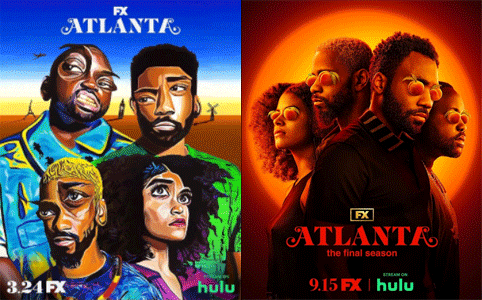Like reaching into a bag of Skittles, you won’t know what flavor you’re getting when you fire up one of the 20 episodes of “Atlanta” (FX) that came out in 2022. But you know it will be tasty as you venture deeper into the Euro-trip Season 3 and the conclusive Season 4 back in the Peach State.
Most of the episodes of Season 1 (2016) and Season 2 (2018) were written by star/creator Donald Glover and brother Stephen. They still do a fair amount of writing, but the 2022 episodes add several new writers. They are given free reign to write about the weird cultural oddities of our age – through a black lens, although many things are universal (which is in itself revelatory about the black experience).
The black experience through a ‘Black Mirror’
If “Black Mirror” wasn’t sci-fi, and was instead about real-world weirdness, it would look like these two seasons of “Atlanta.” Some viewers might be bothered that half the episodes don’t include the main quartet: Donald Glover’s Earn, cousin and superstar rapper Paper Boi (Brian Tyree Henry), mellow friend Darius (LaKeith Stanfield) and Earn’s baby-mama and still-potential-wife Vanessa (Zazie Beetz).
I wasn’t bothered. The “aside” episodes and the main ones develop an appealing push-and-pull. We gradually get accustomed to the asides – starting with “Three Slaps” (3.1), about a black kid who is taken from his “dysfunctional” home and nearly murdered by “well-meaning” white foster mothers.
Narratively, it has nothing to do with Earn’s story. Nor does “The Goof Who Sat By the Door” (4.8), a “Zelig”-esque faux-documentary about a black animator who accidentally rises to the Disney presidency in the 1990s and makes “the blackest movie ever,” 1995’s “A Goofy Movie.”
Other installments are conversation-starting “What ifs.” What if Reparations happened, legally? “The Big Payback” (3.4) answers the question as people’s lives are turned upside-down. Perhaps most frighteningly, some people simply adjust.
Braced for weirdness
While these bizarrely gripping episodes don’t take place in the show’s true narrative, they illustrate issues that Earn and company think about, if only subconsciously, as black people. And they brace viewers for surrealism even when following the main quartet. Much of what we see isn’t literal (indeed, one episode is Earn’s dream, another episode is Paper Boi’s), but it’s real to the characters’ states of mind.

The side trips also provide fun outlets for the actors to show their range. As Van goes through her Lost Weekend in Europe (while the guys are on Paper Boi’s tour), Beetz plays a French-accented version of Van who acts increasingly insane in the dark “Amelie” riff “Tarrare” (3.10).
If ever a male-oriented show would make a woman into a thoroughly developed character, it’s “Atlanta,” but of the main four, Vanessa remains the least solvable. (Even trippy Darius can be summed up as the one who believes we’re all in a simulation. “Yeah, that sounds like Darius,” Earn says.)
Maybe that’s the show’s purposeful statement on women, for better or worse. (It should be noted that these final two seasons include more female writers than the first two.) But I do like how “Atlanta” leaves things with Earn and Van, as shown in the most down-to-earth installment of 2022, “Snipe Hunt” (4.7).
The black experience filtered through ‘Seinfeld’
Illustrating the series’ universality, “The Most Atlanta” (4.1) riffs on “The Parking Garage,” an episode of the infamously not-diverse “Seinfeld.” Earn and Vanessa run into an absurd number of exes at Atlantic Station and try to escape like they’re in reality-warped SF show. Meanwhile, Darius carries around an air fryer like Kramer lugs around the air conditioner.
Darius is being pursued by a woman in a motorized cart who believes he has stolen the air fryer. While it’s not beyond plausibility that Darius would steal something – as we see in the twisty series finale “It Was All a Dream” – in this case he was trying to return the air fryer at a Target-type store when riots break out. (The riots are unexplained, as are many things on “Atlanta” – always part of the point.)
I’ve mentioned in previous reviews how much “Atlanta” reminds me of “Curb Your Enthusiasm” (like “Seinfield,” a Larry David creation), at least with its foundational brand of humor. “The Homeliest Little Horse” (4.2) is a prime example, as it gives a much darker take on “Curb’s” “Spite Store.” Two seemingly unrelated storylines (something we’re accustomed to by this point) converge into an observation about Earn’s mental health.
The surreality of 2022
Like elite stage comedians, “Atlanta” can make anything funny by leaning into absurdity. The riot is funny, and so is the mall shooting in “Crank Dat Killer” (4.6), where Paper Boi fears for his life — rightly, as it turns out.
“Atlanta” Seasons 3 and 4 check off the fears and experiences in the lives of black people — and all people, but “we’re not there yet,” as “Atlanta” might say seriously and/or jokingly. But it’s not about pure fear or pure objective experience.
It’s about how bizarre it is that we’ve come to fear being caught in a mall shootout or being chased by a knife-wielding woman on a scooter who will kill us over a misunderstanding. Living in 2022 is weird. We all know it, but we don’t always know how to describe it.
“Atlanta” does. Glover’s show gives us a knowing glance that says “Yeah, I notice it, too.” Because it’s such a grab-bag of flavors, it won’t be to everyone’s taste and it might be snubbed by some top 10 lists.
Whether it’s your bag or not, “Atlanta” is the most 2022 show of 2022. We can watch it decades from now to remember what living in this year felt like.

